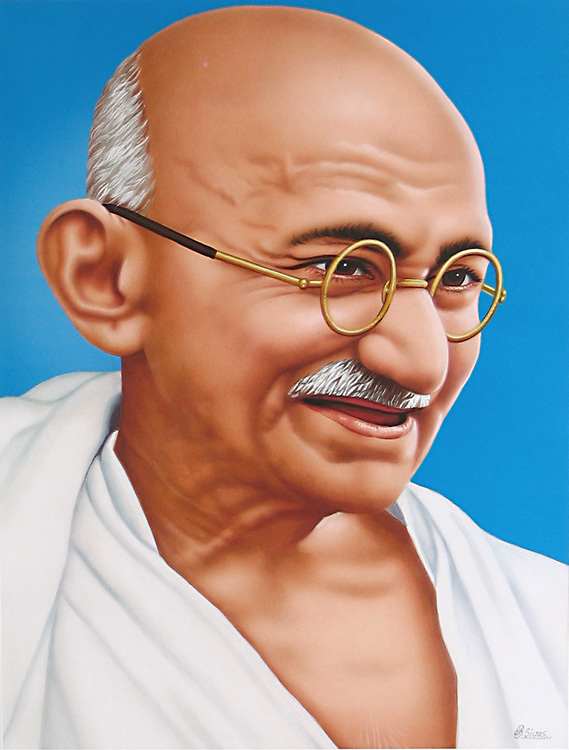
In these dramatic and perilous times, United Nations Deputy Secretary-General Jan Eliasson urged the international community to reaffirm the power and potential of bringing about change through peaceful means, following in the footsteps of Mahatma Gandhi, who inspired today’s International Day of Non-Violence.
“The response to violence is all too often more violence when, in fact, reconciliation and dialogue is needed,” Mr. Eliasson said in a special event for the occasion, held at UN Headquarters in New York.
He called for embracing the fundamental values embodied by Mr. Gandhi: passion, compassion, and belief in the dignity and equal worth of all human beings.
Mr. Eliasson recalled Mr. Gandhi’s warning that “an eye for an eye ends up making the whole world blind.”
The International Day, marked annually on Mr. Gandhi’s birthday, celebrates his non-violent philosophy and tactics have been adopted by leaders around the world. It was established by the General Assembly as an occasion to “disseminate the message of non-violence, including through education and public awareness,” and has been observed annually since 2007.
Mr. Gandhi’s historic “Salt March” against unfair colonial taxation, and his other non-violent resistance inspired change in countries from the Georgia to South Africa, Northern Ireland and the United States, Mr. Eliasson said.
This year’s event is particularly relevant given the resurgence of exceptionalism and sectarianism in parts of the world, the senior UN official said. He added that many minorities find themselves under attack, and civilizations are being displaced as conflicts force them to flee.
“We must reject violence as the futile and default means to bring about change,” Mr. Eliasson said. “We must embrace the path to non-violence and peaceful settlements as the road to sustainable and equitable transformations of societies.”
The UN is strengthening its efforts to bring non-violence to concrete action through preventive diplomacy and the recent “Human Rights up Front” initiative which highlights the need for early action, and the crucial role of responding early to human rights violations.
In his message Secretary-General Ban Ki-moon said principles enshrined in the Universal Declaration of Human Rights, adopted in 1948, the year of Gandhi’s death, owe much to Mr Ghandi’s beliefs.
At this time of increased sectarian violence and the wanton destruction of cultural sites and heritage, “We have to foster a culture of peace, built on dialogue and understanding, for living together in harmony while respecting and celebrating humanity’s rich diversity,” the UN chief said.
Stressing that there is no greater tool than education to enhance human dignity, promote a culture of non-violence, and build lasting peace, Mr. Ban said: “Through education, we can craft new ways of living with each other and the planet. Education can also lay the foundation for developing new forms of global citizenship and solidarity that are so essential in today’s world.”
FRENCH VERSION
n ces temps dramatiques et périlleuses, des Nations Unies Vice-Secrétaire général, Jan Eliasson, a exhorté la communauté internationale à réaffirmer la puissance et le potentiel de provoquer des changements par des moyens pacifiques, en suivant les traces du Mahatma Gandhi, qui a inspiré la Journée internationale d’aujourd’hui de la non-violence .
“La réponse à la violence est trop souvent plus de violence quand, en fait, la réconciliation et le dialogue est nécessaire”, a déclaré M. Eliasson à un événement spécial pour l’occasion, qui s’est tenue au Siège de l’ONU à New York.
Il a appelé à embrasser les valeurs fondamentales incarnées par M. Gandhi: la passion, la compassion, et la croyance en la dignité et la valeur égale de tous les êtres humains.
M. Eliasson a rappelé l’avertissement de M. Gandhi: «Œil pour œil finit par faire tout le monde aveugle.”
La Journée internationale, marquée chaque année à l’anniversaire de M. Gandhi, célèbre sa philosophie non-violente et tactiques ont été adoptés par les dirigeants du monde entier. Il a été créé par l’Assemblée générale comme une occasion de «diffuser le message de la non-violence, notamment par l’éducation et la sensibilisation du public,” et est célébrée chaque année depuis 2007.
Historique “de Salt Mars” de M. Gandhi contre l’imposition coloniale injuste, et son autre changement de résistance non-violente inspirée dans les pays de la Géorgie à l’Afrique du Sud, Irlande du Nord et les Etats-Unis, M. Eliasson a dit.
L’événement de cette année est particulièrement pertinent compte tenu de la résurgence de l’exceptionnalisme et le sectarisme dans certaines parties du monde, le haut fonctionnaire de l’ONU. Il a ajouté que de nombreuses minorités se trouvent sous attaque et que les civilisations sont déplacés que les conflits les forcent à fuir.
“Nous devons rejeter la violence comme moyen futiles et défaut d’apporter des changements”, a déclaré M. Eliasson. “Nous devons embrasser la voie de la non-violence et de règlements pacifiques que la route de transformations durables et équitables des sociétés.”
L’ONU renforce ses efforts pour apporter la non-violence à l’action concrète par la diplomatie préventive et la récente initiative “droits de l’homme de face», qui met en évidence la nécessité d’agir rapidement, et le rôle crucial de répondre tôt pour violations des droits de l’homme.
Dans son message le Secrétaire général Ban Ki-moon, a déclaré principes énoncés dans la Déclaration universelle des droits de l’homme, adoptée en 1948, l’année de la mort de Gandhi, doivent beaucoup aux croyances de M. Gandhi


